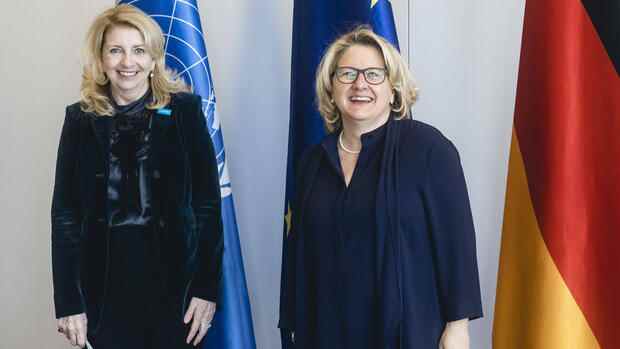It has long been recognized that there are social and economic benefits to investing in gender equality or taking action to end violence against women and girls and to make progress towards gender parity, for example in education.
Societies that abolish discriminatory laws and invest in promoting equal participation in all areas of life are more prosperous economically and more peaceful for all.
What is less known is the extent to which development progress is prevented and what the costs are when societies cling to norms or policies that lead to the oppression of women and girls and limit their participation.
This is particularly evident in Afghanistan, the only country that excludes girls from secondary education. An analysis by Unicef shows that the current regime’s decision to bar millions of girls from secondary school is costing the country a 2.5 percent drop in its annual gross domestic product. An enormous burden for Afghanistan, where people are already suffering from a devastating economic crisis.
Top jobs of the day
Find the best jobs now and
be notified by email.
Limited educational opportunities for girls cost trillions of dollars worldwide
The World Bank estimates that reduced educational opportunities for girls and barriers to completing 12 years of schooling cost countries around the world between $15 trillion and $30 trillion in lost productivity and income.
Conversely, investments that enable girls to complete their secondary education could boost gross domestic product in emerging markets by 10 percent.
Educating girls also helps protect them from harmful practices, such as early marriage. Due to the severe economic impact of the Covid-19 pandemic, these are currently increasing again.
Just a single year of high school can reduce a girl’s likelihood of being forced into marriage by five percentage points or more.
The human cost of child marriage is unacceptable. Girls who marry early are at higher risk of domestic violence, more likely to experience complications during pregnancy or childbirth, and face other threats to their health and well-being later in life.
The economic impact of child marriage is correspondingly large. According to a study by the International Center for Research on Women and the World Bank, eliminating child marriage could save developing countries billions of dollars in expenditure.
The Federal Republic promotes fair access to resources with feminist development policy
Domestic and gender-specific violence also demand a humanly unbearable and economically unacceptable high price. According to conservative estimates, the economic cost of lost productivity due to domestic violence is 1.2 to 2 percent of gross domestic product.
This is equivalent to spending on primary education in most low- and middle-income countries. A study in Lesotho showed that violence against women and girls cost 5.5 percent of gross domestic product in 2017.
Gender inequality more broadly – the persistent inequality of opportunity and underrepresentation of women and girls – costs billions of dollars. Gender equality in income alone could increase total global wealth by 14 percent.
Especially at a time of limited resources and against a backdrop of competing priorities for funding for development cooperation, it is important to demonstrate that we must invest in development that fosters sustainable growth and resilience through empowerment of girls and women.
>> Read here: One year of Taliban rule in Afghanistan: where is feminist foreign policy?
With its feminist development policy, the Federal Ministry for Economic Cooperation and Development will increase investments in order to achieve these goals. As a long-standing and reliable partner, Unicef resolutely supports this objective.
Germany’s feminist development policy aims to realize the rights of women, girls and other marginalized groups, to end structural inequalities and unfair access to resources, and to improve the economic and social participation of women and girls.
From investing in entrepreneurship to educating women and girls to tackling gender-based violence, advocating gender justice is a key lever for sustainable development that leads to economic gains in both the short and long term, and to increased peace and prosperity.
Gender equality also benefits young men
In societies in which girls and women can lead a self-determined and fulfilling life, everyone benefits, including boys and young men. This is evident in countries that promote equality in education – and through education.
This also includes an education system that is free of negative gender stereotypes. In these countries, for example, boys are less likely to drop out of school, join criminal gangs or be recruited into armed groups.
The inequality between the sexes does not arise by chance, it is the result of certain power structures, discriminatory norms and role models. Eliminating structural inequalities, unequal treatment and discrimination in the long term requires determination and the power of persuasion.
We bring this with us and we are convinced that many more have the will to achieve real gender equality.
The authors:
Svenja Schulze is Federal Minister for Economic Cooperation and Development.
Catherine Russell is Unicef Executive Director.
More: Commentary on International Women’s Day: Equality must not remain a privilege of the West
